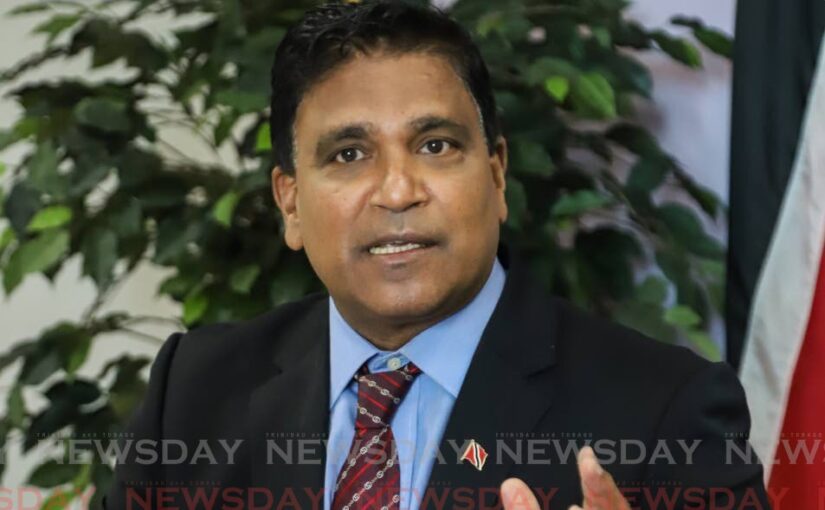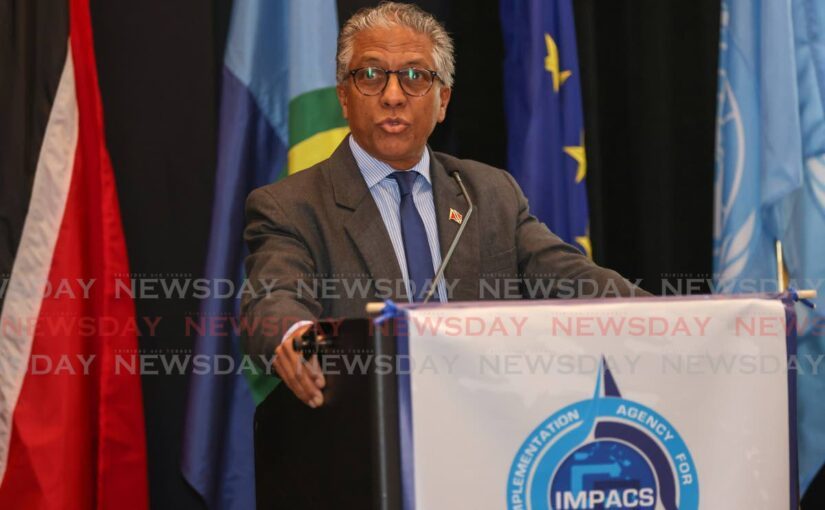FIVE law lords have reserved their decision in a challenge over the Registration, Recognition and Certification Board’s (RRCB) decision to deny a...
Vous n'êtes pas connecté
- English
- Français
- عربي
- Español
- Deutsch
- Português
- русский язык
- Català
- Italiano
- Nederlands, Vlaams
- Norsk
- فارسی
- বাংলা
- اردو
- Azərbaycan dili
- Bahasa Indonesia
- Հայերեն
- Ελληνικά
- Bosanski jezik
- українська мова
- Íslenska
- Türkmen, Түркмен
- Türkçe
- Shqip
- Eesti keel
- magyar
- Қазақ тілі
- Kalaallisut ; kalaallit oqaasii
- Lietuvių kalba
- Latviešu valoda
- македонски јазик
- Монгол
- Bahasa Melayu ; بهاس ملايو
- ဗမာစာ
- Slovenščina
- тоҷикӣ ; toğikī ; تاجیکی
- ไทย
- O'zbek ; Ўзбек ; أۇزبېك
- Tiếng Việt
- ភាសាខ្មែរ
- རྫོང་ཁ
- Soomaaliga ; af Soomaali
Rubriques :
 Maroc - NEWSDAY.CO.TT - A la Une - 29/Aug 06:48
Maroc - NEWSDAY.CO.TT - A la Une - 29/Aug 06:48
One from ten leaves nought
My first feeling of dismay and personal loss, in reference to a political event, was the break-up of the West Indies Federation. I felt it personally, and it took me many years to stop blaming Alexander Bustamante, whose opposition led Jamaican prime minister Norman Manley to call a national referendum on the issue. I came to learn a lesson that was valuable later in life when it comes to teamwork: "Ten minus one equals nought." I also learned something valuable about political loyalties as well, but we will not go into that here. One lesson I learnt about teamwork, which is still applicable, is that business linkages are sustainable, and indeed, other than the West Indies cricket team, can be more tenacious than other interest groups. The Caribbean Employers Confederation, the Caribbean Chamber of Commerce and the Caribbean Manufacturers Association come to mind, as they maintain regional contact because of communal interests, and because so many member organisations have branches or connections, and certainly interests, in many other Caricom member states. As a result, labour and employment laws that affect one affect most conglomerates that operate in the region. Executives and professionals who move from one Caricom state for business purposes can be hired in one state and fired in another. When terminations are challenged, it is useful for the stakeholders to have some cognisance of the legislation variations that face them. The first foundational awareness to take into consideration is that most jurisprudence in the Caribbean has a basis in common law. Although courts and industrial tribunals are not bound to each other, they do hold hands in a storm. Knowledge of how they approach matters of principle and traditional practice when it comes to industrial relations is useful. In Barbados, for example, a collective agreement is upheld as a matter of honour, whereas in neighbouring countries such as TT, a collective agreement, once registered, has the force of law. In Grenada, a collective agreement, closer to the Barbados pattern, is distinguished from criminal law, and decisions in the case of a dispute arising are referred to the director of the Department of Labour. In Barbados, the charge of "serious misconduct" means any grave offence which includes, but is not limited to, unprovoked assault, wilful damage to the employer’s property, proven dishonesty and refusal to carry out a reasonable request in accordance with duties. Wrongful dismissal that is dealt with under the IRA in TT will be handled under the Severance Pay Act in Barbados and under the Labour Code, found in the Labour Relations ACT (2016) in Grenada. There is no distinction between "unfair" dismissal and "wrongful" dismissal. In Jamaica, the Industrial Tribunal is the arbitral body that makes the distinction between a worker being dismissed in a manner which is lawful or not. A lawful dismissal can still be referred to the tribunal as being unjustified. In order for this to be done, however, the employee must not have accepted pay in lieu of notice, which would be considered agreement with the dismissal. In TT, the Industrial Court has made it clear that in dismissal cases the Industrial Relations Act has superseded the common law, and that in a dismissal case, the court shall: "(a) make such order or award in relation to a dispute before it as it considers fair and just having regard to the interests of the persons immediately concerned and the community as a whole, "(b) act in accordance with equity, good conscience and the substantial merits of the case before it, having regard to the principles and practices of good industrial relations." This will cover both the requirements of giving adequate notice and acting fairly, covered in common law and, in its own words in Section 10 (6), eschewing circumstances that are harsh and oppressive. In a Caroni case back in 1997, a company secretary, a position normally excluded from the definition of manager, had her case dealt with by the Industrial Court, indicating that it is not the nomenclature alone that may decide the issue of representation, but it must act in accordance with and in good conscience. In Barbados, it should be noted, under common law, there is no distinction between a worker and a manager going to court over a dismissal issue, as both are working under contracts of employment. In TT, however, only a worker can take a dispute to the Industrial Court, and it must be taken through a recognised trade union. If a manager wishes to take a dismissal case to the Industrial Court, he will have to prove that he is not responsible for the formulation of policy or has an effective voice in so doing in any undertaking or business, or is in control of any business or any undertaking thereof, as those are the definition of "manager." In Jamaica, managers can also take disputes or their own grievances to the Labour Tribunal, as the Labour Relations and Industrial Disputes Act provides a framework for resolving their disputes as well. In the event that the governments of the Caricom region see the wisdom of once again forming a federation, the differences in labour legislation would greatly benefit from being resolved, as the disparate acts all have common-law bases and jurisprudential traditions. The post One from ten leaves nought appeared first on Trinidad and Tobago Newsday.
Articles similaires
How to recruit a recruit
Recruitment is an aspect of business management that can go very wrong if it is not treated with due diligence. It is the locus of many subsequent...
RULAAC miffed by IGP Egbetokun’s Conflicting Statements on Minors who collapsed while being arraigned in Court
Rights group, Rule of Law and Accountability Advocacy Centre, RULAAC on Tuesday expressed worry over what it described as the contrasting...
EFCC Seeks Yahaya Bello’s Trial in Absentia
The Economic and Financial Crimes Commission, EFCC, on Wednesday October 30, 2024 asked Justice Emeka Nwite of the Federal High Court sitting in...
Complex Systems And The US Election – OpEd
With the US presidential election mere days away, American citizens first and foremost – but also people in other countries, given what is at...
AG: EMBD Privy Council loss means nothing for cartel claim against Moonilal
ATTORNEY General Reginald Armour says the recent Privy Council ruling instructing the Estate Management and Business Development Company Ltd (EMBD)...
Industrial court awards RM792k in back wages to developer's ex-director for unfair dismissal
KUALA LUMPUR: A former director of a property development company was awarded RM792,000 in back wages by the Industrial Court last week after it...
You Should Be Sanctioned For Perjury', PTD Chides NUPENG President
The Petroleum Tanker Drivers (PTD) Branch of Nigeria Union of Petroleum and Natural Gas Workers (NUPENG) has taken a swipe at the President of the...
EMBD’s fishing expedition
IMPORTANT lessons should be learned from the Estate Management and Business Development Company Ltd (EMBD)’s failed defence of a case brought by...
EFCC vs. Yahaya Bello: Court adjourns ruling, arraignment to Jan. 21
The Federal High Court in Abuja has postponed the next hearing in the money laundering case against former Kogi State Governor Yahaya Bello, filed...
Les derniers communiqués
-
Aucun élément








